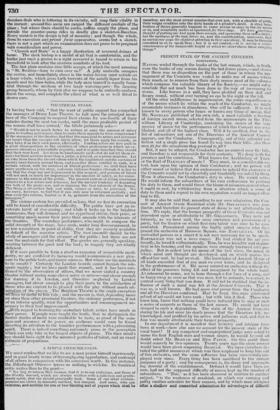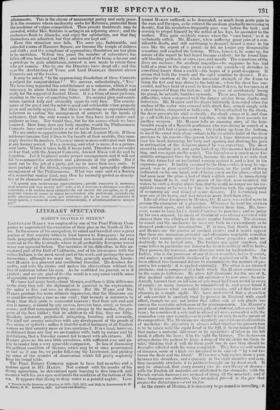PRESENT STATE OF THE ANCIENT CONCERTS.
CONCLUSION.
HAVING waded through the books of the last season, which, in truth, were the books of any season during the last dozen years,—and shown that there was no disposition on the part of those in whom the ma- nagement of the Concerts was vested to make use of means within their reach, or to remove from their dusty repose most of the volumes which compose the valuable library of the Society,—we might safely. conclude that not much has been done in the way of increasing it's stores. Like horses in a mill, they have plodded on their dull and dreary round, without ever turning an eye to the right or the left. Of the utter indifference to improvement, the entire regardlessness of the means which lie within the reach of the Conductor, we might accumulate instances in abundance. One will be sufficient. It is \veil known to every person who hears or knows any thing of music, that Mr. NOVELLO published at his own risk, a most valuable collection of foreign sacred music, selected from the manuscripts in the Fitz- william Library at Cambridge, containing the scores of the very species of music for the performance of which this Concert was esta- blished, and all of the highest class. Will it be credited, that in the list of subscribers not one of the Directors of the Ancient Conceit appears, nor the Conductor. Consequently, out of this splendid col- lection not a single piece has found its way into their bills. Are these men fit for the situations they pretend to fill But, it may be alleged, the Conductor has no control over the bills, and therefore is not responsible for their contents. We deny both I he premises and the conclusion. What knows the Archbishop of YORK or the Earl of DARNLEY of music ? They must, to a considerable ex- tent, lean upon the opinion of their Conductor ; and no person viIl either assert or believe that his endeavours to uphold the character of the Concerts would not be cheerfully and thankfully seconded by them. Were it otherwise, the Conductor's duty is clear. He would retire. He would inform the subscribers of his vain endeavours to perform his duty to them, and would throw the blame of mismana genie w here it ought to rest, by withdrawing from a situation which a sense of duty to them and a regard to his own reputation would no loncrer allow him to fill.
It may also be said that, according to our own admission, the Con cert of Ancient Music flourished while 111r. GREAToas:x was con- ductor, and therefore its present state of decay is not attributable to him. We reply, that the former prosperity of these Concerl s was not dependent upon or attributable to Mr. GREATOREX. They were not formerly, as we have said, the snug enclosure and possession of a party, but the theatre on which first-rate talent was sure to be con- centrated. Preeminent among the highly gifted singers who then graced the orchestra of Hanover Square, was BARTLE:AA:v. Of his unrivalled powers as a singer it is not now necessary for its to speak. BARTLEMAN was not a mere singer. He had studied his art pro- foundly, he loved it enthusiastically. True, he was haughty and dogma- tical in his beaming, and his opinions were strongly tinctured with pre- judice. But in ardent love for music of the first class, the music in which mind and thought are developed, and on which genius has affixed her seal, he had no rival. His knowledge of Ancient Music of all kinds exceeded that of any man we ever knew, and he delighted in the performance of it. He never entered an orchestra without the effect of his presence being felt and recognized by I he whole band. At rehearsal he came, not to hum through a few bars of a son;;-, and to hurry away as soon as that was over, but to animate, to correct, to control every thing that was done. It will not be doubted that the in- fluence of such a mind was felt at the Ancient Concerts. That it was so, is well known. He had more real power than the Conductor and all the Directors combined. Had he lived, this once celebrated school of art could not have sunk ; but with him it died. Those who knew him, know that nothing could have induced him to sing at such a series of concerts as those of the last season. He could not have stooped to such a degradation. The state of the Ancient Concerts during his life and since his death proves that the Directors felt, ac- knowledged, and profited by his active and judicious zeal, and that to him was mainly attributable their former prosperity. In one department it is manifest that industry and intrigue have been at work—how else can we account for the present state of the vocal band? If any competent and unprejudiced judge were asked to name the first English man and woman singer, he would beyond all doubt select Mr. BRAHAM and Miss PATON. On this point there would scarcely be two opinions. Twenty years ago the same answer would have been given respecting BRAHAM. We have elsewhere de- tailed the pitiful manceuvre which was then employed to keep him out of this orchestra, and the same influence has been successfully em- ployed ever since. Every thing has been sacrificed to the narrow purposes of a party ; and the consequence is, the decay and approach- ing downfal of the establishment. Defunct it would have been ere now, had not the supposed difficulty of access kept up the number of subscribers. "This," as it has been observed in relation to another subject, "is the weakness of mankind, on which our cunning and paltry vanities calculate for their success, and by which man intrigues after a shallow and unmerited admiration for advantages of difficult
attainments. This is the charm of manuscript poetry and early pease. It is the resource where mediocrity seeks for flatterers, protected from the insolence of vulgar competition. Thus private theatricals may be crowded, whilst Mrs. Siddons is acting in an adjoining street ; and the exclusives flock to Alinacks, and enjoy the satisfaction, not that they themselves are admitted, but that others are kept out."
Even this stimulant now fails. The once gay, fashionable, and es:waded rooms of Hanover Square, are becbme the temple of dulness and sloth ; and the symptoms of approaching dissolution are too plain to be mistaken. Within two years the number of subscribers has fallen off one hundred and fifty ; and instead of its being a favour and a privilege to gain admittance, interest is now made to retain those who yet remain. One by one the Directors have dropt off; and this year the Archbishop of Yome. and Lord DARNLEY directed eleven Concerts out of the twelve.
It may be asked, "Is the approaching dissolution of these Concerts a subject for congratulation ? " We answer, unhesitatingly, "Yes." We have long regarded this establishment as a nuisance, which it was necessary to abate before any thing could be done effectually and really for the support of Ancient Music. It is a thing of mere pretence, standing in the way of something better. Its original plan and consti- tution carried folly and absurdity upon its very face. The counte- nance of the great and the noble is good and serviceable when properly,' given and usefully applied. But there is something so supereminently ludicrous in vesting the management of concerts in the hands of noblemen, that the only wonder is how they have lived under such guidance so long. Nor would they, but for the causes which we have assigned. How long, does any body imagine, would the Philharmonic Concerts have survived under a set of noble Directors ?
We are under no apprehension for the fate of Ancient Music. If these noblemen imagine that it lives in the breath of their nostrils, they ama- zingly deceive themselves. Classical music is more cultivated DOW than at any former period. It is a growing, and what is more, it is a perma- nent taste. Where it takes hold, it keeps hold. Therefore we are under no fear that, with the Ancient Concerts, Ancient Music will die and be forgotten. ,Let it be placed under proper management, and it will not fail to command the attention and patronage of the public. But it must not be the job of a party, got up to serve their own ends. It must partake of the liberal, comprehensive, and (generally) efficient management of the Philharmonic. , What was once said of a Society of a somewhat similar kind, may then be correctly quoted as descrip- tive of its character and intention :- "E questa una instituzinne sapientissima; perchè conserva la memoria degli nomini pin ben meriti dell' arte, e dà ii comodo a chiutique ascolta di conoscere, e di sentire assai chiaramente col mezzo del paragone, se il pH' moderni vanno di mano in mano accostandosi alla pertezione, second° che molt prcsuppongono, overo per contrario gut se ne sono allontanati di lingo spazio, c vanno di continuo ritiocedcndo, e allontanandoscne sempre pin"



















 Previous page
Previous page